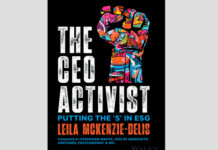A new report from The Conference Board not only shows that most employers find today’s political environment more difficult to navigate, but also that a third plan to refrain from publicly addressing social and political topics.
According to the study carried out in collaboration with international law firm Steptoe LLP, nearly 60% of corporate executives say today’s political environment is more difficult to navigate compared to four years ago. The top factors fuelling this challenging environment are polarisation among policymakers (according to 71% of survey respondents) and the electorate (60%). Employees are also a major source of pressure, with 48% of respondents indicating that increasing employee demands on social and political matters is exacerbating the situation.
“In today’s highly polarised environment that’s rife with misinformation, companies need to serve as trusted sources, especially for employees. Organisations can consider efforts that go beyond encouraging employees to vote; a more comprehensive initiative can include educating them about the democratic process, the implications of public policy decisions, and the impact of their own participation in the political process,” said Merel Spierings, Senior Researcher at The Conference Board and report author.
DEALING WITH HOT-BUTTON TOPICS
Additional findings show that since 2020, the majority of companies (60%) have become more selective about taking public stands on hot-button topics, with 40% having established clearer criteria and processes for addressing such issues. Moreover, 29% have established a core group of cross-functional executives to take the lead in addressing such issues. However, 12% have stopped addressing them altogether. In fact, a third of companies (36%) expect their companies to take fewer stands on social and political issues.
“As companies evaluate whether to take stands on contentious social and political issues, their criteria for responding should include more than whether the issue relates to the company’s core values. Having that be the sole determinant risks creating a virtually unlimited license (and perceived obligation) to take stands. Other important factors to consider include the issue’s connection with the business and the ability of the company to make an impact,” said Matteo Tonello, Managing Director of The Conference Board ESG Center.
GROWING BACKLASH & REPUTATIONAL HARM
The study also found that more companies (55%) also find today’s legal and regulatory environment more challenging than in 2020. The top factor fuelling today’s challenging environment include increasing regulation at the state/local level (70%). Other leading factors include increasing federal regulation (64%) and uncertainty about regulations and enforcement (53%).
About a third of companies (36%) find the corporate political activity landscape (including lobbying, PAC giving, and corporate political contributions) more challenging than in 2020. Companies face growing backlash and reputational harm if their political spending and lobbying activities appear to be at odds with their core values, policy positions, and public statements, noted the report.
TACKLING DEI, AI & ESG MATTERS
Since 2020, 60% of companies have expanded the scope of their lobbying to cover additional issues compared to four years ago. These issues range from AI to voting rights to DEI matters. State and local lobbying has also steadily grown in recent years. Almost half (43%) of companies have increased the resources they direct toward state/local governments since 2020. State and local lobbying can help companies navigate the tension between pro-ESG regulations and anti-ESG sentiment. For example, state-level policymakers and candidates are the leading sources of ESG opposition, making it critical for companies to build direct relationships with them.
However, most companies recognise that policy volatility makes lobbying particularly challenging during an election year. In fact, 65% of companies say the outcome of the US federal elections will impact their lobbying efforts, and 47% say the same about the outcome of the state/local elections.





































